Location
The World Agroforestry Centre (ICRAF) is a CGIAR Consortium Research Centre. ICRAF’s headquarters are in Nairobi, Kenya, with six regional offices located in Cameroon, China, India, Indonesia, Kenya and Peru.
The Centre’s vision is a rural transformation throughout the tropics as smallholder households increase their use of trees in agricultural landscapes to improve their food security, nutrition security, income, health, shelter, social cohesion, energy resources and environmental sustainability.
ICRAF's mission is to generate science-based knowledge about the diverse benefits - both direct and indirect - of agroforestry, or trees in farming systems and landscapes, and to disseminate this knowledge to develop policy options and promote policies and practices that improve livelihoods and benefit the environment.
The World Agroforestry Centre is guided by the broad development challenges pursued by the CGIAR. These include poverty alleviation that entails enhanced food security and health, improved productivity with lower environmental and social costs, and resilience in the face of climate change and other external shocks.
ICRAF's work also addresses many of the issues being tackled by the Sustainable Development Goals (SDGs) that aim to eradicate hunger, reduce poverty, provide affordable and clean energy, protect life on land and combat climate change.
Members:
Resources
Displaying 111 - 115 of 146A Protocol for measurement and monitoring soil carbon stocks in agricultural landscapes
POLYSCAPE: Multiple criteria GIS toolbox for negotiating landscape scale ecosystem service provision
Climate Change Adaptation for Smallholder Farmers in Southeast Asia
Climate change is set to have a significant impact on climate-sensitive sectors of national economies, such as agriculture. This report, published by the World Agroforestry Centre, discusses the challenges that climate change brings to smallholder farmers in Southeast Asia, and outlines adaptive measures that can be taken. It begins with a brief general discussion of climate change and moves on to describe the likely impacts for farmers. The following section highlights adaptive strategies available to small-scale farmers in the region.
Constraints and options to enhancing production of high quality feeds in dairy production in Kenya, Uganda and Rwanda
Pro-poor Payment for Environmental Services: Some Considerations
PES is a new concept gaining momentum in the Asia-Pacific region. But what are the enabling conditions for employing PES schemes, and how can they be made pro-poor? Payment for Environmental Services (PES) sets up systems where beneficiaries of environmental services reward the providers of such services with payments or other non-financial goods (market access, land security, public services, infrastructure, capacity building).





